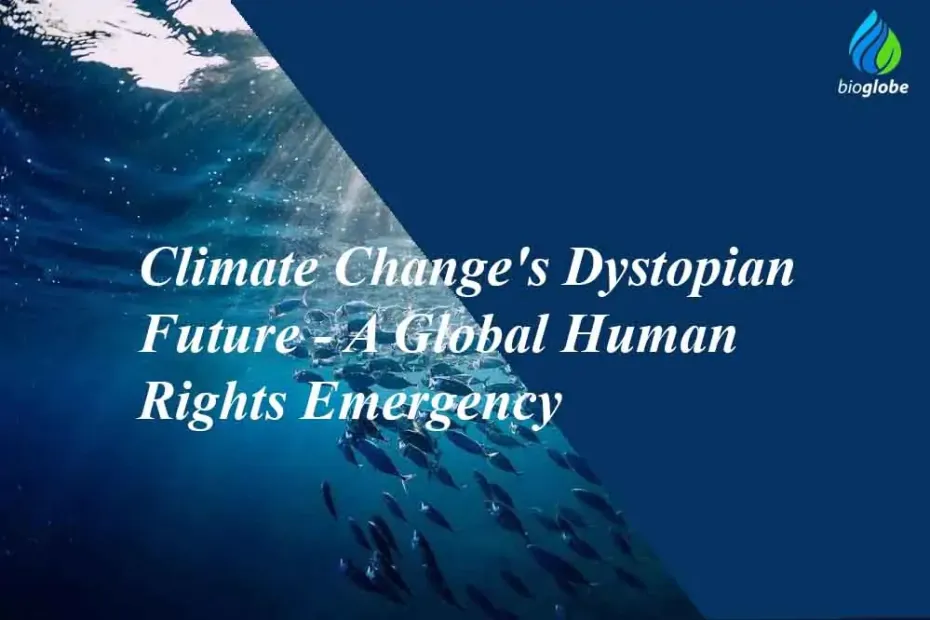Climate Change’s Dystopian Future – A Global Human Rights Emergency
Introduction
The ominous specter of climate change has long haunted discussions of our planet’s future. However, as the United Nations human rights chief, Volker Turk, recently declared, that dystopian future is no longer a distant scenario—it is already here. The effects of climate change have manifested as urgent human rights crises worldwide, with Iraq serving as a poignant example of the “environmental horror” that is sweeping across nations. In this blog post, we’ll delve into the harrowing realities of climate change-induced human rights emergencies and explore the pressing need for immediate action to address this global crisis.
Iraq’s “Environmental Horror”
Volker Turk’s address to the UN Human Rights Council shed light on Iraq’s deteriorating situation, where climate change has led to “spiraling damage.” In Basra, Iraq, a once-thriving region now grapples with the devastating consequences of climate change—drought, searing heat, extreme pollution, and a rapid depletion of freshwater resources have transformed this once-vibrant landscape into a barren expanse of rubble and dust. Turk’s message is clear: climate change has triggered a human rights emergency in Iraq, and this crisis is not unique to one nation. It is a global catastrophe.
The Global Impact
The impact of climate change extends far beyond the borders of Iraq. Millions of people worldwide are being pushed to the brink of famine as climate change disrupts agricultural patterns and exacerbates food insecurity. Opportunities are vanishing, homes are disappearing, and lives are being lost. Urgent warnings have become tragic realities, reminding us that the dystopian future we feared is already unfolding before our eyes.
G20’s Renewable Energy Pledge
Over the weekend, the leaders of the Group of 20 (G20) wealthiest nations expressed support for tripling renewable energy capacity by 2030. While this commitment represents a step in the right direction, it falls short of addressing the root cause of the problem—fossil fuels. The G20 failed to commit to a phase-out of fossil fuels, a crucial step in mitigating the climate crisis.
Global Climate Protests
In response to the lack of decisive action from world leaders, the Climate Action Network has announced a series of global climate protests. Millions of climate activists from around the world will unite to demand an immediate exit from coal, oil, and gas usage. These protests are timed to coincide with a pivotal climate summit scheduled for September 20 in New York City, hosted by UN Secretary-General Antonio Guterres. As global temperatures reach record highs, Guterres has called for greater ambition in our fight against climate change to avert the worst consequences of climate chaos.
The Paris Agreement and the Urgent Need for Change
The 2015 Paris Agreement set ambitious goals to limit global temperature rise to 1.5 degrees Celsius above pre-industrial levels. Achieving this goal requires net zero greenhouse gas emissions by 2050 and a halt to new fossil fuel extraction projects. The International Energy Agency issued a warning years ago that new fossil fuel projects must cease to keep global warming within the 1.5-degree limit. Despite government pledges, hydrocarbon production continues unabated worldwide.
A Call to Action
At the UN COP27 climate summit last year, over 80 countries called for a phase-out of fossil fuels in the final statement. Yet, some developed nations, including the United States, Britain, Canada, Australia, and Norway—historically responsible for the climate crisis—have persisted in developing more fossil fuels, a move criticized by the group Oil Change International.
In regions like Pakistan’s Sindh province, which suffered unprecedented flooding last year, the demand for a fossil fuel phase-out is growing louder. Farooq Tariq from the Kissan Rabita Committee, a collective of farmers in the region, declared, “The fossil fuel industry and its supporters bear responsibility for the climate crisis and perpetuate a predatory and destructive economic system that harms both people and the planet.”
Conclusion
The UN’s warning is crystal clear: the dystopian future driven by climate change is not a distant nightmare—it is a chilling reality for many nations. Urgent action is needed to address the human rights emergencies arising from climate change, and this action must include a resolute commitment to phase out fossil fuels. As millions around the world unite in global climate protests, the time for change is now. We must rise to the challenge of climate change to protect our planet and the rights of future generations.


